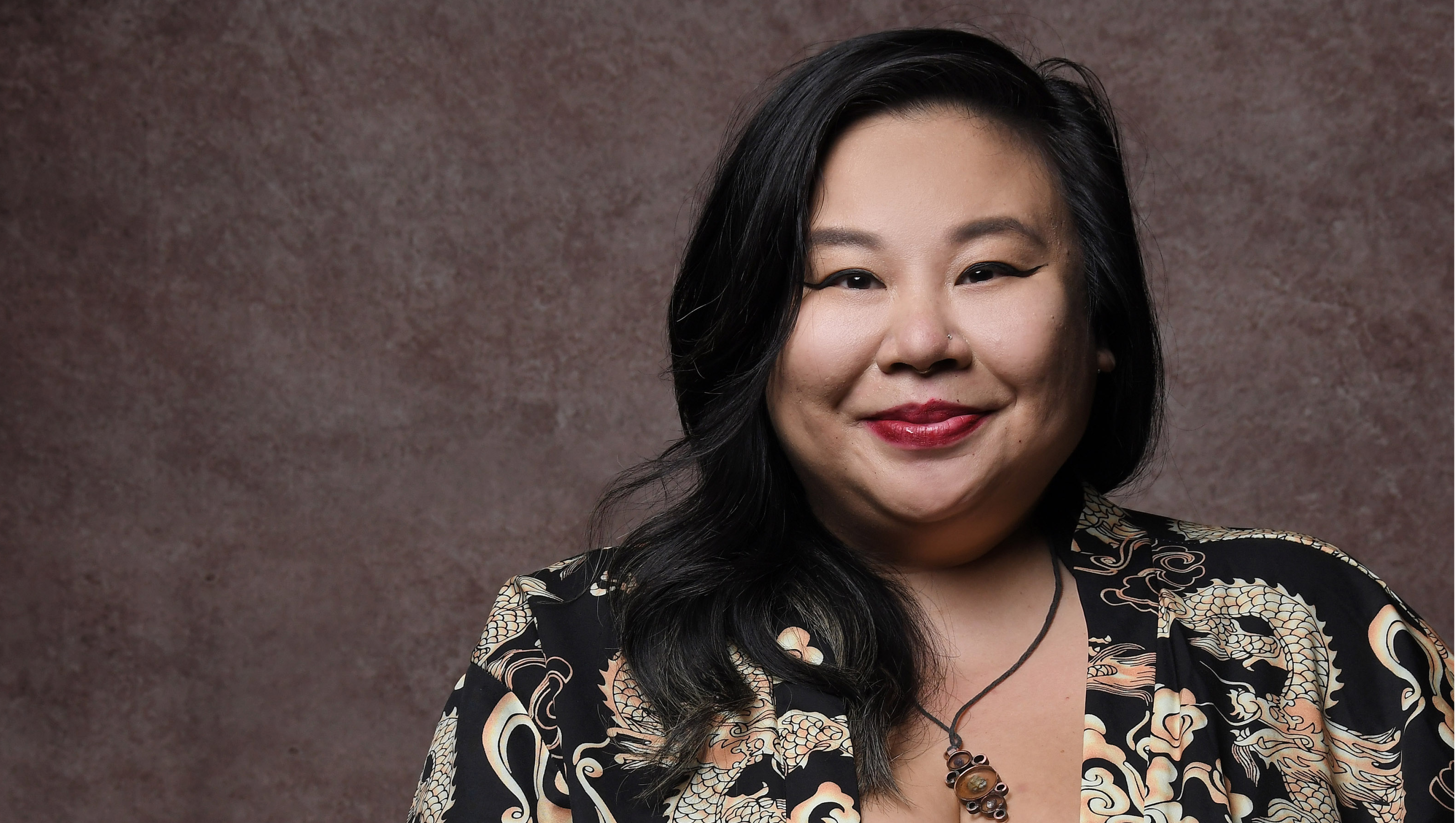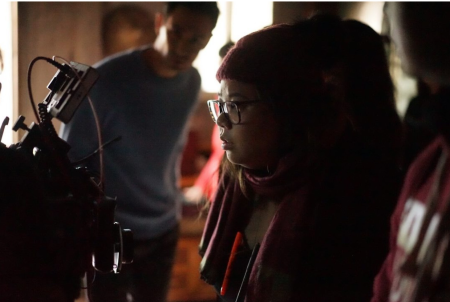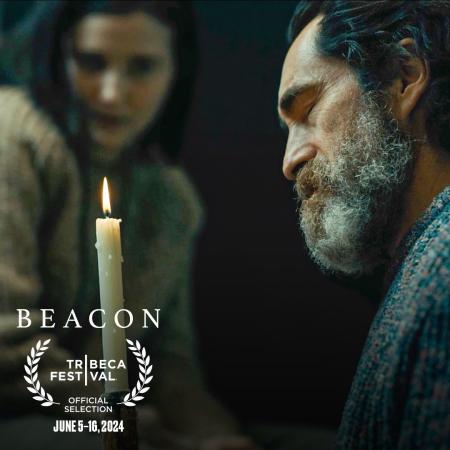
Roxy Shih ‘10 (B.A., Film and Media Studies and Sociology) is a Taiwanese American director nominated for best directing at the Daytime Emmys for her work on the Dark/Web (Amazon) series in 2020. Her latest feature film, Beacon, stars Academy Award nominee Demian Bichir and Julia Goldani-Telles. The film had its world premiere at Tribeca Film Festival in June 2024. A big champion of her community, Roxy co-founded the Taiwanese American Film Festival in Los Angeles and previously served as the festival director for two years.
In 2021, Roxy directed the entire series of Facebook Watch's Mira Mira, a smash-hit seen by over 60 million viewers. The show broke the record for the highest viewed Crypt TV series on Facebook Watch. In 2019, her second feature, the horror-thriller Painkillers premiered on Hulu. And in 2016, Roxy directed her debut post-apocalyptic thriller, The Tribe, which was received well by critics and audiences alike after a successful festival run. She has directed episodes on both seasons of The Haunted Museum, a series produced by Zak Bagans and Eli Roth, which can be viewed on MAX. Her feature List of a Lifetime, with Kelly Hu and Shannen Doherty, was acquired by Lifetime and served as their centerpiece film for Breast Cancer Awareness Month. The film was nominated for Best Made-For-TV Movie by the 2022 Critic's Choice Awards and Hollywood Critics Associations Awards.
"I think it’s more important than ever to make art in these uncertain times."
You began at UC Irvine as a sociology major, but then took a film course and your mind was blown. You switched to film and media studies, which set you up to consider filmmaking as a career. Can you tell us a bit more about your story? How did you launch into filmmaking after graduation? What did that period immediately post-graduation look like?
I actually decided to double major in sociology and film studies after taking Film 85A. As a naturally curious person, I’ve always felt that sociology intersects with film studies, and applying what I learned from both made me into the storyteller I am today. When I graduated from UCI, I was eager to start working. I didn’t consider a graduate degree since I didn’t see myself as an academic (which is ironic now as an Associate Professor at ArtCenter). At that time, the path to a career was hazy, and I wasn’t sure where to start. I wasn’t even sure what I was good at.
Despite those fears, my roommate and I decided to take a chance. We ended up renting a small apartment in Culver City. My short-term goal was to see what would develop in a year since I didn’t have a foot in the door. I took Craigslist jobs, free personal assistant (PA) work and did whatever I could to pay the rent and plant some seeds across the city. It was really difficult, and I often felt lost. I distinctly remember going to a Rite Aid, where I met a nice gentleman who was checking out my items. I shared with him that I just moved to L.A. to pursue becoming a filmmaker. He responded by saying, “That’s hard. You’re going to get a lot of nos... But once the first yes comes, so will the rest of the yeses.” It was a core memory for me, and I remember that moment to this day because it is so true. As I worked my way up in the industry, carrying coffee cups for producers and then leading my own projects, that quote was always in the back of my mind. I’ve made a lot of mistakes moving through this business, but the work and people are gracious as long as you learn from them.
The biggest lesson I’ve learned is that people will always remember the way you make them feel, and that character speaks louder than talent. In the past fifteen years, I’ve worked in post-production before moving into producing, and finally pivoting to where I am now as a writer/director. It’s exciting to work as a multi-faceted filmmaker. Every step in my journey was crucial for me to be where I am today. It’s a privilege to experience the industry from multiple perspectives. And the best thing about being a filmmaker is that I’m constantly learning, personally and technically, no matter how seasoned I become.

Where do you draw inspiration for your work?
I’ve always been naturally curious about people and about what connects us rather than what separates us. I cherish the moments where I have the privilege to engage in a conversation with a complete stranger. Doing this job has empowered me to become a really good listener and I believe a conversation with a stranger can be a great gift. You may never meet again, but sometimes the resonance of that exchange can lead to profound shifts (like the gentleman from Rite Aid). I had a brief stint as a Lyft driver, and I cherished that time in my life deeply.
I once had a passenger who was working a night shift cleaning at the Staples Center (now The Crypto Arena). He was 19 and about to become a father. He was scared but also excited. I felt honored that he chose to share that with me in our short ride. Another time, I had a mom and daughter from the midwest who came to participate in The Price is Right, and they were astounded that I worked on a music video that starred their favorite soap actor. They tried adding me on Facebook, which I felt was sweet since being associated with the project made me a mini-celebrity in their eyes... even though I was merely their Lyft driver.
"To me creativity means playfulness, fearless experimentation and radical self-love. Throwing out any fear of failure, and being willing to embrace imperfections. Your creativity is a reflection of where you are in your relationship with yourself."
I invite conversations to happen because it’s a part of the human experience, which I take very seriously when it comes to my work. It’s a privilege to be a writer/director, and I wield my voice responsibly. I carry each of these people I have met into my life; their challenges, hopes and dreams, and embed it into the tapestry of the film. People are what fundamentally inspire me, because I love them so deeply, everything else is icing on the cake.

What do you see as the possibilities of horror as a genre to work in?
It’s really funny how I’ve become known as a horror filmmaker when I didn’t watch very much before I became a director. But when I first started making films, the material naturally had a horror framework. After a few years of excavating why this is so, I realized that it was because this space gave me a unique entry to dive straight into what I was questioning. I wasn't thinking about it consciously at the time, but themes involving gender politics and the subdued rage in women came up constantly in my work. Horror always felt like a safe genre in which to explore these themes. It’s cathartic and therapeutic (and fun to shoot as well). In terms of resonance, everyone understands fear because it doesn’t require verbal language. It exists within all of us, and by using horror as a sandbox we may just have enough courage to step in, process our fears and confront the monster – whether it’s outside or within us.
AI. SAG strike. Political unrest. Corporate overreach. In light of these major issues/conditions, and many others, how do you see the future of filmmaking? And more generally, what does your future in filmmaking look like?
I think it’s more important than ever to make art in these uncertain times. As storytellers, we are the documentarians of the world we’re living in, and it’s an important time to galvanize. Speak your truth, and take power in harnessing your voice. Technology has given us the tools to make our own work and to amplify it to the world, creating community.
On a larger scale, I see the collapse of the studio system (they’ll still be around, just not as many), and the coming of an indie renaissance. It’s already happening now with how our culture has been shifting since the pandemic – the fight for sustainable living, for marginalized communities, for our planet. It’s reflected through the downfall of streaming, which has shown us that, more than ever, profit-driven models are no longer the course. Audiences are experiencing IP fatigue, becoming more desensitized as oversaturation forces filmmakers to make more “content” rather than cinema.
There has been deep fear the past couple of years that there might be the death of the movie theaters, but this was disproved by Barbenheimer and recently Wicked, which shows that people are still hungry and willing to show up to cinemas. After these trying years, I feel very positive about what’s to come. The industry has contracted before, but we always come back. Unexpected shifts always happen, but I think it’s important to be flexible, open to pivoting and embrace how storytelling methods can change.
What does creativity mean to you?
To me creativity means playfulness, fearless experimentation and radical self-love. Throwing out any fear of failure, and being willing to embrace imperfections. Your creativity is a reflection of where you are in your relationship with yourself. Many are afraid of this approach, because we can be so fearful of being bad at something. But it’s also important to acknowledge that art is merely the process of refining; whether it is writing, editing, painting, singing... any type of medium.
We are all sloppy when we first start out, but the discipline is the ability to throw it all at a wall, stare at it and be like, “Okay, it’s all out there, let me clean it up.” And with every stage of refinement, the soul of what you’re expressing becomes clearer. Creativity isn’t something that you search for externally. It’s the courage in taking that first step, being kind to yourself and the discipline to refine it until you feel that whatever you’re making is honest to you.
Creating art is a bit like nurturing a child – it will get messy and there will undoubtedly be frustrating moments. But to always come back, doing your best to raise it, until it’s out in the world when it is no longer yours. Creativity exists in every moment, in every choice. The hardest part sometimes is simply giving it permission to exist.
Interested in reading more from the School of Humanities? Sign up for our monthly newsletter.
